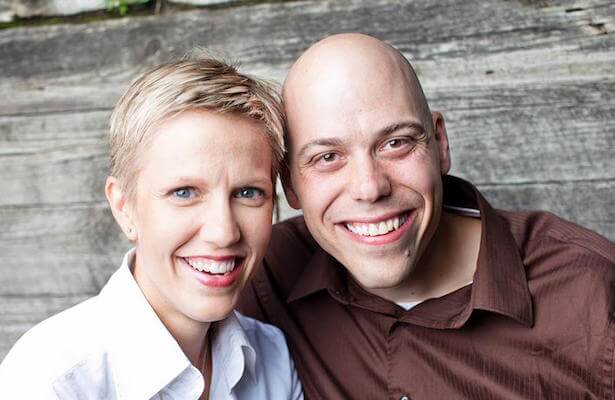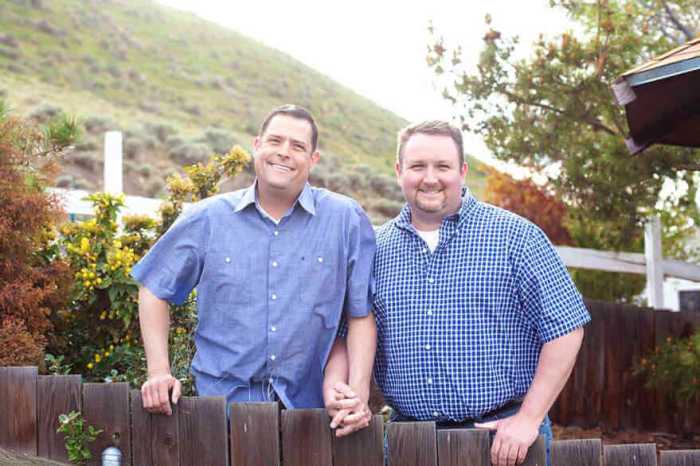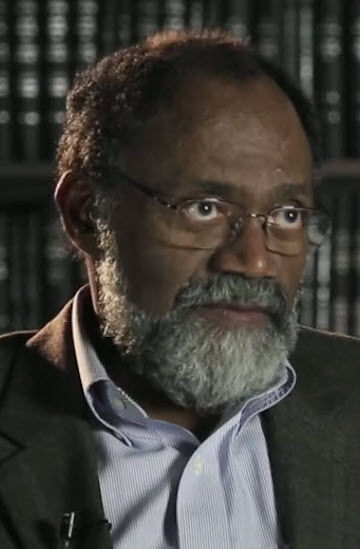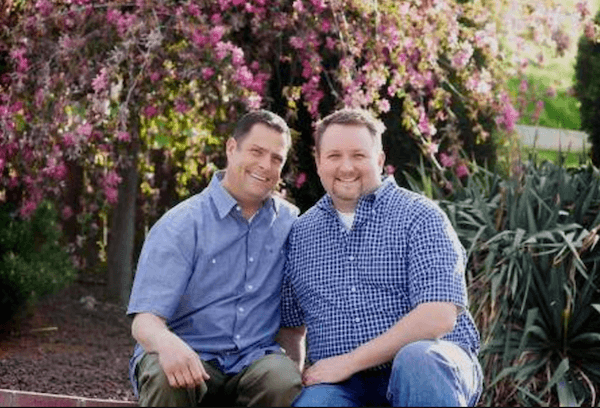Minnesotans Angel and Carl Larsen were turned back in their effort to have a federal court rule they are free to exclude same-sex couples in providing wedding video services. | ALLIANCE DEFENDING FREEDOM
For the first time, a federal judge has ruled that for-profit businesses do not enjoy a constitutional right to refuse to provide services to same-sex weddings on the same basis they provide them for different-sex weddings. The September 20 ruling from Chief Judge John R. Tunheim of the US District Court in Minnesota turned back a suit brought by Alliance Defending Freedom (ADF), an anti-gay religious litigation organization, on behalf of Carl and Angel Larsen and their videography business, Telescope Media Group.
Tunheim’s comprehensive ruling may provide a preview of what the US Supreme Court will say in the pending Masterpiece Cakeshop case from Colorado, at least regarding the First Amendment issues common to both cases.
ADF immediately announced that it will appeal the court’s ruling to the St. Louis-based Eighth Circuit Court of Appeals.
Minnesota law barring public accommodations discrimination offers no religious out
Tunheim’s ruling is particularly significant because it is the first by a federal court to address this issue. Since 2013, several state appellate courts have ruled against such exemptions from complying with state anti-discrimination laws, rejecting appeals by wedding venues, photographers, florists, and bakers seeking to overturn rulings against them by state human rights agencies.
Here, however, the Larsens and Telescope Media Group, claiming it was expanding into the wedding video business, sought an advance declaration from the federal court that they would be constitutionally protected if they were threatened with prosecution under Minnesota’s ban on public accommodations discrimination, which includes protections based on sexual orientation.
This issue had stayed out of the federal courts, in part, because there is no federal law prohibiting discrimination based on sexual orientation — or sex, for that matter — by businesses providing goods or services to the public. When “sex” was added as a prohibited ground of discrimination to the pending 1964 Civil Rights Act in Congress, the amendment was directed solely to the employment discrimination section of the bill. The public accommodations section was not amended to include “sex.”
The Equality Act bill first introduced in Congress two years ago would add both “sex” and “sexual orientation” — as well as “gender identity” — to that part of the Civil Rights Act.
The previous state rulings all came in cases where businesses were being prosecuted under a state law.
The Larsens strongly oppose same-sex marriage, and one of their stated goals in expanding their business is to propagate their view that only a marriage between a man and a woman is appropriate by including in every contract a provision in which the couple purchasing their services gives Telescope Media the right to make the video public on their website and in social media postings. They also want to be able to include a notice on their website that they do not provide video services for same-sex marriages.
The Minnesota public accommodations law was amended in 1993 to add “sexual orientation” as a prohibited ground of discrimination. When Minnesota enacted its marriage equality law in 2013, the State Department of Human Rights (MDHR) published an “interpretive guidance” for businesses covered by the law, stating clearly that it “does not exempt individuals, businesses, nonprofits, or the secular business activities of religious entities from non-discrimination laws based on religious beliefs regarding same-sex marriage.” The guidance makes clear that people denied services by such businesses can file discrimination charges with the agency, which could result in legal penalties.
ADF alleged in its complaint that Telescope Media was contacted by at least one same-sex couple seeking video services for their wedding, but were told the company does not do wedding videos. So far, that action is legal, since the company is not yet discriminating between same-sex and different-sex couples. But seeing a lucrative business opportunity, the Larsens say that are concerned about their legal liability and want the shelter of a declaratory judgment that they enjoy the federal constitutional right to turn down same-sex wedding business.
ADF came up with seven different legal theories based on the First and 14th Amendments — violations of the Larsens’ rights to free speech (both in advertising and in an alleged responsibility to post same-sex marriage videos on their website), expressive association, free exercise of religion, equal protection of the laws, and both procedural and substantive due process. The court rejected their argument that under the Minnesota law they could be compelled to display publicly any same-sex marriage videos they might produce.
Tunheim carefully and systematically rejected all of their arguments, drawing extensively on US Supreme Court decisions dealing with comparable situations.
But before tackling the substance of the Larsens’ claims, the judge had to decide whether the lawsuit was an attempt to get an advisory opinion, which is beyond the jurisdiction of federal courts. Given the MDHR notice that declining same-sex marriage business would violate the State Human Rights Act, Tunheim concluded that it was not merely theoretical that Telescope Media would be prosecuted if it implemented its exclusionary plan. As a result, he rejected the state’s argument that he lacked jurisdiction because the case was purely hypothetical, finding that the Larsens are deterred by the MDHR announcement from exercising what they assert are their constitutional rights.
On the merits, however, Tunheim agreed with the growing body of state appellate court decisions that reject the constitutional claims the Larsens made.
He found that the MDHR’s policy is not a content-based regulation of speech, does not target religion, is subject only to intermediate scrutiny under both the First and 14th Amendment, and is justified by the state’s important interest in preventing discrimination by businesses providing goods and services to the public.
Tunheim specifically rejected ADF’s argument that the MDHR policy toward Telescope Media amounts to government-compelled speech. The company, he found, “provides a ‘conduit’ that allows others to pay for speech.” Since there is “little risk” that the public would attribute that “speech” to the Larsens, whatever “creative license” they exercise in creating the video, their claims are not subject to the “strict scrutiny” typically employed by courts in weighing free speech claims. The Larsens, Tunheim wrote, “may easily disclaim the message of its customers.” Weddings, he wrote, “are expressive events showcasing the messages and preference of the people getting married and attendees.”
The Larsens, the court wrote, can always post an announcement on their website stating their opposition to same-sex marriage while noting that they produce videos of such weddings only to comply with state law.
On the question of Telescope Media’s right of expressive association, Tunheim noted that ADF’s argument would undermine all anti-discrimination laws were a court to accept the argument that every interaction with a potential customer could be avoided on grounds of “forced association.”
Finding the Minnesota Human Rights Act to be content-neutral regarding religion, the court easily rejected the idea that evenhanded application of the law would constitute a violation of free exercise of religion, and it similarly rejected the argument that the law imposed an “unconstitutional condition” on the Larsens’ ability to conduct business in Minnesota.
Tunheim also rejected ADF’s equal protection argument, since the law applies to all videography businesses, and found that there was no vagueness in its requirements that would support a procedural due process claim. And, he concluded, the Minnesota law did not violate any substantive 14th Amendment due process rights since there is no recognized “fundamental right to work or operate a business free from regulations that one dislikes.”
ADF’s appeal to the Eighth Circuit is unlikely to result in any quick decision because the Supreme Court has accepted review of the Masterpiece Cakeshop case, which presents many of the same issues on an appeal of a Colorado Court of Appeals ruling. That state court found that Master Cakeshop and its owner, Jack Phillips, violated Colorado’s human rights law by refusing to make a wedding cake for a same-sex couple based on his religious objections to same-sex marriages. The high court will probably hold oral argument in that case next year, with a decision expected by June 2018.
In 2014 and 2015, the Eighth Circuit put pending marriage equality appeals on hold while the Supreme Court considered an appeal from the Sixth Circuit that led to the Obergefell ruling.
Still, ADF alleged legal theories in the Telescope Media suit that were not advanced in the Masterpiece Cakeshop case, so a Supreme Court ruling there might not definitively answer all the questions raised by the Larsens. The Eighth Circuit could conclude the two cases are sufficiently distinct to move forward on Telescope Media without waiting for the Supreme Court’s ruling.




































